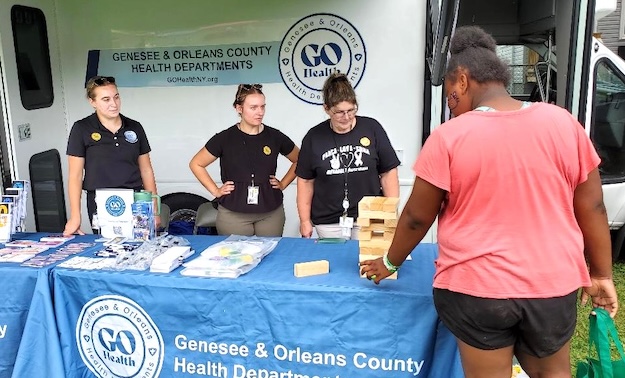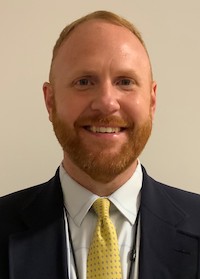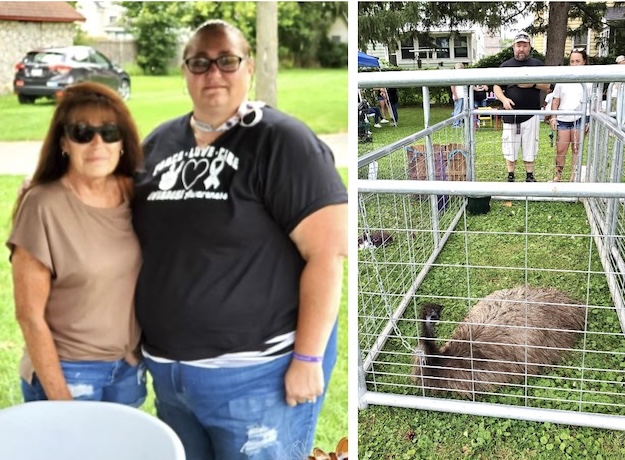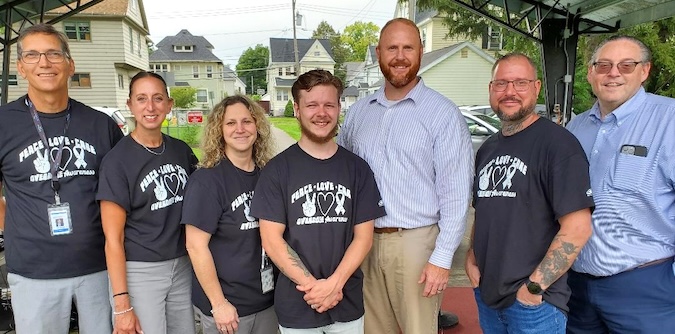On Overdose Awareness Day, speakers share hope for recovery
By Mike Pettinella, UConnectCare Publicist
BATAVIA – “We are best when we serve others,” said the keynote speaker at Wednesday afternoon’s Overdose Awareness Day observance, using the words of famed anthropologist Margaret Mead to illustrate how citizens can unite to save the lives of those beset by substance use.
Speaking to about 150 people at Austin Park in Batavia, Rob Kent, president of the Virginia-based Kent Strategic Advisors, LLC, and former general counsel for the White House Office of National Drug Control Policy, shared the story of when Mead was asked by a student what she considered to be the first sign of civilization in a society.
“The student expected her to say fish hooks, whatever, clay pots, grinding stones. But she said, ‘That’s not it,’” Kent said. “She said the first sign in ancient civilization was a femur, a thigh bone that was broken and then healed.
“And that mattered because if you broke your leg at that time, you died, you were gone. So, it showed that someone took the time to take care of that person, to heal them, to get them back to strength. She said that helping someone else through difficulty is where civilization starts.”
Kent suggested that those in the audience “are the signs of civilization and the reasons that we are best when we serve others.”
“In the history of the U.S., we’ve overcome wars, natural disasters, terrorist attacks, pandemics, epidemics,” he said. “We have a history of stepping up and helping others in need. We can do that here. However, we won’t succeed by always telling others what they need to do. We need to do it ourselves, and I won’t give up.”
Kent, a native of Central New York, is a longtime advocate for people who struggle with a substance use disorder, treatment providers who help and the recovery community. He previously worked for the state’s Office of Addiction Services and Supports.
Event sponsored by GOW CARES Alliance
He was one of several speakers at the annual event, which was sponsored by the GOW CARES Alliance, formerly known as the GOW Opioid Task Force. Sue Gagne and Amy Kabel, co-chairs of the alliance’s Family, Loved Ones & Allies work group, coordinated the observance along with Jay Baran, GOW CARES Alliance coordinator.

Genesee & Orleans Health Department employees Grace Marzolf, left; Laiken Ricker and Sherri Bensley assist an attendee at one of two dozen agency vendor booths.
Overdose Awareness Day is a worldwide movement to end overdose and to remember without stigma those who have died while acknowledging the grief of family and friends left behind. This year’s theme was Together We Can.
“That highlights the power of our communities when we all stand together and when we all work together,” Kent said, “As we gather on this day, I think of the people who are not here (due to an overdose death) and the people who I never got to meet who I know through their families and friends who love them.”
Concerning the potency of drugs today, Kent said, “I’m scared because having now worked in Washington in the White House, the drugs are getting more lethal and they’re incredibly effective at capturing someone.”
“And they’re not going to get less lethal. I would love to tell you they will, but they won’t,” he said. “We’re losing the equivalent of a small U.S. city every year … over 100,000 people … Fentanyl has changed everything.”
He noted that people more people are dying from drugs laced with fentanyl, and he said that society needs to hold government accountable for letting the cartels continue to flourish.
Pettit cites ‘shift in the playing field’
Locally, 145 people have died from a drug overdose in Genesee, Wyoming and Orleans counties since 2019, said Paul Pettit, public health director for Genesee & Orleans Health Departments.

Paul Pettit
“Drug overdose is the leading cause of injury mortality in the nation,” he said, reporting that there were 76 fatal overdoses in Genesee and 35 in Orleans since 2019 and 34 in Wyoming since 2020. “One is too many; 145 is unacceptable.”
Pettit said there has been “a shift in the playing field” in recent years, from prescription drugs to heroin to fentanyl and now to cocaine, methamphetamine and other “recreational” drugs.
He did share some good news in that, according to the Centers for Disease Control and Prevention, the number of overdose deaths nationwide declined for the first time last year since 2017, and that there has been only one opioid-related death in Genesee County thus far in 2024.
Pettit pointed to the numerous initiatives supported by the health department, including analysis of wastewater to see what drugs are being used, a text for Naloxone (Narcan) line, Naloxboxes in businesses and public places, and increased Naloxone access and training.
The Rev. Erin Martin, a pastor at City Church, recounted her time in Los Angeles a few weeks ago, specifically a place called MacArthur Park.
“You go down there, and it’s so evident of the overdose and substance abuse right there in the park,” she said. “And we were with a group of people that you would go there and offer hot dogs and just asked people if they wanted prayer for anything. Then, we would direct them to a free recovery program and, honestly, it broke my heart.
Martin: That’s somebody’s love one
“It opened my eyes, but it broke my heart because I have a 20-year-old son, and I kept thinking, that’s somebody’s son, that’s somebody’s daughter, somebody’s mom, somebody’s grandpa, somebody’s dad. And while only a percentage took the opportunity to go to recovery, we let them know that recovery is possible and they’re not alone.”
Martin quoted Galatians 6:2 from the Bible: Carry each other’s burdens.
“We are here to help one another. We are here on this earth to be together,” she said. “You see, everybody needs people to laugh with, people to share things with and to celebrate life with. But friendships aren’t just about enjoying the good times together. Friendships are about sharing all times together, and that includes the good, the bad and the ugly.”
Lynda Battaglia, director of Genesee County Mental Health & Community Services, said that losing someone to an overdose can have a devastating impact that ripples across the community.
“It leaves significant grief for those left behind and while we remember those we have lost, we also heighten our dedication to reduce stigma surrounding those affected by substance use,” she said. “Every single person here today has the ability to be an agent of change.”
Battaglia said family members emphasize that their loved one “should not be defined by their diagnosis or the addiction that stole them, but should be remembered as human beings.”
“I am hopeful that the collaborative efforts by the Genesee and Orleans Fatality Review Boards help raise awareness and changes the lens from which people see addiction and overdose.”
Powerful words from a “COA”

(Left) Susan Adams, left, and daughter, Jamie Torrence, are doing their part to help those struggling with substance use disorder. (Right) Animals from Josh Frega’s Funny Farm, including Bebu the Emu (pictured) as well as geese, baby goats, rabbits and chickens, participated in the event.
Chris Budzinack Jr., son of the UConnectCare supportive living counselor who served as emcee for the event, told of growing up as a COA, or child of addiction.
He said thought that the constant fighting, yelling, his father being in and out of jail, and the family’s multiple changes of address were part of a normal life.
Only when his father finally faced his demons, reached out to God and turned his life around 15 years ago, did the young man see how his upbringing was all wrong.
“Because someone was there for him and walked with him, it allowed my dad to work on himself and become a better father and a better husband,” Budzinack Jr. said. “And the more people that gathered around us, the better our lives had gotten and we grew as people at an amazing rate.”
He said he was the first of the family to graduate from high school and went to complete what he called Leadership School.
“I have a steady job now, a beautiful wife and two kids,” he said. “I can say that recovery is possible and help is available because you’re not alone.”
CEO Bennett: A call to action
UConnectCare Chief Executive Officer John Bennett said Overdose Awareness Day is “not just a day of remembrance, it is also a call to action.”
Bennett, who has worked in the substance use treatment field for 40 years, said, “We must push for policies that prioritize mental health and addiction treatment.”
“Change begins with awareness and education, and it is our responsibility to ensure that those in need of help have access to compassionate care and recovery services.”
He said that “it boggles my mind that when we advocate for more treatment and recovery options, the community comes out with pitch forks against us.”
He and the other speakers urged people to share their stories and the stories of the loved ones they’ve lost in order to break down the stigma that often surrounds addiction.
Susan Adams of Batavia is one of those people who shared the story of her stepson, Jason, who died of a fentanyl-laced heroin overdose in October 2018. Adams was attending the observance in support of her daughter, Jamie Torrence, who works for UConnectCare.
“Jason was 32 and he left two children and one unborn,” said Adams, mentioning that he struggled with drug use since he was a teenager. “We thought he was doing OK. He had a job and kids and a baby on the way.”
She said she continues to make herself available to help others overcome their problems with drugs.
“If you can help one person, it’s worth it,” she said.
More than two dozen agencies and businesses from Genesee, Orleans and Wyoming counties participated in the event.
For more information about the GOW CARES Alliance, email jbaran@uconnectcare.org.

























































